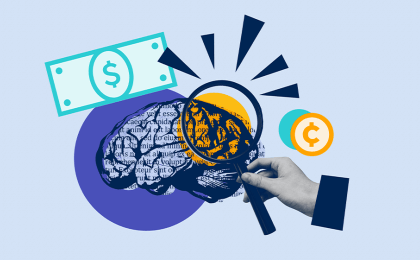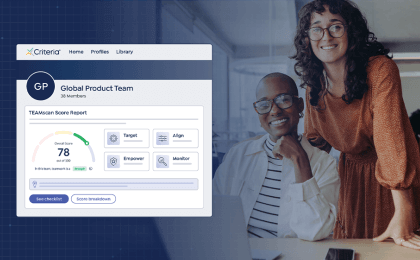The realities of the modern workplace are changing. Over the last few decades, new technology has changed the way we work, the way we interact with each other, and the very jobs we hold. More recently, the global COVID-19 crisis has caused a massive shift to remote work, highlighting the importance of strong communication and adaptability in the face of change.
Succeeding at work today is about more than raw talent, work ethic, or drive. Organizations are now realizing that another quality is increasingly important: emotional intelligence.
Emotional intelligence is the ability to perceive, use, understand, and manage emotions in yourself and others. It was first conceptualized in the 1990s and has seen a dramatic rise in popularity since then.
One study from CareerBuilder found that 71% of employers value emotional intelligence over IQ. The World Economic Forum also listed it as one of the top 10 skills needed to excel at work. So what is it about emotional intelligence that makes it so valuable today? There are a couple of major factors.
EI is tied to job performance.
Numerous studies have indicated that individuals with high emotional intelligence perform better than those with low emotional intelligence. For example, researchers have found strong links between EI and important organizational behaviors, including general job performance, organizational citizenship, commitment, job attitudes, stress, well-being, teamwork, and counterproductive work behaviors.1 2
EI is also tied with the quality of interpersonal relationships at work.
Emotional intelligence has a major impact on how well an employee interacts with coworkers and builds relationships. Strong EI can improve the experience of stress, pressure and conflict, and enhance decision-making3. Studies have also shown that it increases positive attitudes towards work and enhances altruistic feelings4.
People with high EI are more adaptable.
With so many changes happening in short succession, employees need to be adaptable. Research has shown that people with higher EI are often able to adapt successfully while people with lower EI demonstrated poorer ability to cope with stressors at work5. Emotional intelligence helps people successfully interpret their own emotions and evaluate how to move forward in a positive and productive way.
EI is one of the most important qualities for leadership.
Emotional intelligence has rapidly become one of the most desirable qualities in a leader because EI encompasses many other qualities, including empathy, self-awareness, and the ability to inspire and motivate others. In an independent study, Pepsico was able to reduce executive turnover by 87% by recruiting emotionally intelligent leaders6.
EI is particularly associated with performance in sales and customer service.
Because strong emotional intelligence can help build and maintain relationships, it’s no surprise that EI would play a major role in how well sales and customer service workers perform. At L’Oreal, salespeople who were selected on the basis of emotional competencies outsold people recruited in the traditional way. These individuals sold $91,370 more than other salespeople, leading to a net revenue increase of $2.5m. They also had 63% less turnover during their first year7.
And there’s even an abundance of evidence to show that emotional intelligence can be learned and improved over time. At American Express, financial advisors undertook EI training and improved their sales performance by 18%. When managers went through the same training, their entire group’s performance increased by 10%.
Emotional intelligence can be measured.
We recently released Emotify, an interactive assessment of emotional intelligence, which measures a candidate’s ability to perceive, understand and manage emotions. It has helped organizations identify candidates who are adaptable, emotionally aware, and capable of building strong, long-lasting relationships. The assessment is now available to all Criteria customers. Learn more about the assessment or start a free trial to try it for yourself.
--
1. Kellowy, E Kevin., Day, Arla L., October 2005, Building healthy workplaces: What we know so far. Canadian Journal of Behavioural Science, Vol 37(4), 223-235
2. Matthews, Gerald., Emo, Amanda K., Funke, Gregory., Zeidner, Moshe., Roberts, Richard D.,Costa Jr., Paul T., Schulze, Ralf., June 2006, Emotional intelligence, personality and task-induced stress. Journal of Experimental Psychology: Applied. Vol 12(2), 96-107
3. Lopes, Paulo N., Grewal, Daisy., Kadis, Jessica., Gall, Michelle., Salovey, Peter. (2006) Evidence that emotional intelligence is related to job performance and affect and attitudes at work. Psicothema, Vol 18 supplement, 132-138. Zeidner, Moshe., Matthews, Gerald., Roberts, Richard D. (2004) Emotional Intelligence in the Workplace: A Critical Review. Applied Psychology, Volume 53, Issue 3, pp 371-399.
4. Carmeli, Abraham. (2003) The relationship between emotional intelligence and work attitudes, behavior and outcomes: An examination among senior managers. Journal of Managerial Psychology, Vol 18 Iss 8, 788-813 5 Matthews et al., 2006
5. Matthews et al., 2006
6. McClelland, D C. (1998) Identifying competencies with the behavioral event interviews. Psychological Science. Vol. 9, No. 5
7. Spencer, L.M., & Spencer S.M (1993). Competence at work: models for superior performance. New York: Wiley





